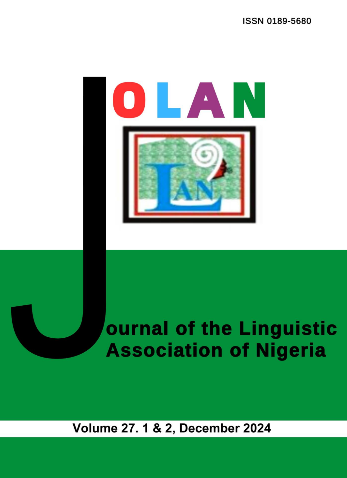Some Morphological and Phonological Processes in Akan Day-Names Formation
Keywords:
Akan, personal day-names, morphology, phonology, slave namesAbstract
The structure of personal day-names in Akan, a Niger-Congo (Kwa) has been conceived of as having root morphemes and affixes in their composition in the underlying representation (UR), hence they are derived through affixation (cf. Christaller 1933, Ofori 2019). In this paper, I show that each of the day-names is rather a compound of the noun+noun type in composition in the UR. The data for this study were collected from literature and also from my own intuition as a native speaker. The main objective of this paper is to examine the morphological and phonological processes by which each of the male and female day-names can be derived. As a morphological composition, I show that both male and female day-names have a common template: deity names. The gender distinction between both male and female is the attachment of either /kwa-/ [kʷá], a shortened form of àkòá [àkʷʊ ̀á] ‘man, slave’ (morpheme1) or /-ba/ [bá], which is from ɔ ̀bá ‘child, offspring’ (morpheme2) for male or female respectively. The phonological operations that the day-names undergo in the derivation include deletion, vowel harmony, vowel raising, etc. is support my analysis with language-internal evidence as well as records of names of Barbadian and Jamaican slaves of Akan original dating back to the 16th century. In deriving all these personal day-names, I propose common templates for all personal day-names (both males and females) as follows: akoa + name of the deity (of the day on which one was born) for male day-names, and name of the deity + ɔba for female day-names. I conclude that not only does the postulation of the compounding of the components of the day-names sheds more light on their compositional make-up, but we are also able to explain tonal phenomenon lexical downstep in some of the day-names.
.
References
Abakah, E. N. 1993. Some aspects of the phonology of the Mfantse dialect of Akan. MPhil Thesis, University of Ghana, Legon.
Abakah, E. N. 2013. Vowel replacement patterns in the Mfantse dialect of Akan. Journal of Universal Language 14 (2). 7-51.DOI: 10.22425/jul.2013.14.2.7
Abakah, E. N. 2015. On tone and morphophonology of the Akan reduplication Construction. Journal of Universal Language 16 (1), 1-47.
Adomako, K. 2012. Vowel raising in Akan reduplication. Legon Journal of Humanities 23, 155-184.
Adomako, K. 2015. Truncation of some Akan personal names. Gema Online Journal of Language Studies 15 (1), 143-162.
Adomako, K. 2017. Morphophonological analysis of Akan female family-name formation. Ghana Journal of Linguistics 6 (3), 1-32. http://dx.doi.org/10.4314/gjl.v6i3.1
Agyekum, K. 2006. The sociolinguistic of Akan personal names. Nordic Journal of African Studies 15(2), 206-235.
Agyekum, K. 2010. The ethnopragmatics of Akan compliments. Legon Journal of Humanities 21, 13-38.
Ansu-Kyeremeh, K. 2000. Communicating nominatim: Some social aspects of Bono personal names. Research Review New Series16 (2), 19-33.
Appah, C. K. I. & Amfo, N. A. A. 2011. The morphopragmatics of the diminutive morpheme (-ba/-wa) in Akan. Lexis 6: “Diminutives and Augmentatives in the Languages of the World”, 85-103.
Boadi, L. A. 1984. How to derive Araba and Abenaa from a common underlying form representation:
some comments on historical methodology. Anthropological Linguistics 26 (4), 435-444.
Boadi, L. A. 1988. Problems of palatalization in Akan. Journal of West African Languages 18 (1), 3-16.
Boadi, L. A. 2009. A comparative phonological study of some verbal affixes in seven Volta Comoe languages of Ghana. Accra: Black Mask Ltd.
Boadi, L. A. 2014. A minor historical rule of GRAVE concern in the Volta-Comoelanguages. Legon Journal of Humanities 25, 142-153.
Brempong, O. 1991. Twi etymology: a study in ethno-linguistics. Research Review New Series 7 (1&2), 93-110.
Christaller, J. G. 1875. A grammar of the Asante and Fante language called Tshi (Chwee, Twi). Basel: Basel Evangelical Missionary Society.
Christaller, J. G. 1933. Dictionary of the Asante and Fante language called Tshi (Chwee, Twi) (2nd Ed.). Basel: Basel Evangelical Missionary Society.
Crayner, J.B. 1988. Yeehyiahyia oo! Accra: Bureau of Ghana Languages.
de Jong, K. & Obeng, S. G. 2000. Labio-palatalisation in Twi: contrastive, quantal, and organizational factors producing uncommon sound. Language 76 (3), 682-703.
DeCamp, D. 1967. African day-names in Jamaica. Language 43 (1), 139-149.
Dolphyne, F. A. 1986. The language(s) of the Akan people. Research Review 2(1), 1-22.
Dolphyne, F. A. 1988. The Akan (Twi-Fante) language: Its sound systems and tonal structure. Accra: Ghana Universities Press.
Gosse, P. H. 1851. A naturalist's sojourn in Jamaica. London: Longman, Brown,Green, and Longmans.
Handler, J. S. & Jacoby, J. 1996. Slave names and naming in Barbados, 1650-1830. The William and Mary Quarterly, Third Series 53 (4), 685-728.
Long, E. 1774. The history of Jamaica. London: T. Lowndes. Cited in DeCamp (1967).
Obeng, S. G. 1989. Advanced Level Akan Phonology: Essays in Memory of P.C. Sgt. D. M. Gyasi. Mimeograph. University of Ghana.
Obeng, S. G. 1997. From morphophonology to sociolinguistics: The case of Akan hypocoristic day names. Multilingua-Journal of Cross-Cultural and Interlanguage Communication 16 (1), 39-56.
Obeng, S. G. 2001. African anthroponymy: An ethnopragmatic and morphophonological study of personal names in Akan and some African societies. Munich: Lincom Europa.
Ofori, S. A. 2013. A prosodic analysis of monosyllabic and disyllabic verb reduplication in Twi (Akan). Journal of African Languages and Linguistics 34 (1), 75-109. https://doi.org/10.1515/jall-2013-0003
Ofori, S. A. 2019. Rules and rule relations in Akan day names. Journal of West African Languages 46 (1), 47-73.
Owu-Ewie, C. 2014a. A morphosyntactic analysis of some Fante habitation names (econym). The International Journal of Humanities & Social Studies 2(5), 232-243.
Owu-Ewie, C. 2014b. A morphosyntactic analysis of Fante personal names. Paper presented at 7th Annual Linguistics Association of Ghana Conference, University of Professional Studies, Accra, Ghana.
Schachter, P. & Fromkin, V. 1968. A Phonology of Akan: Akuapem, Asante and Fante. UCLA Working papers in Phonetics, no. 9. University of California, Los Angeles.
Welmers, W. E. 1946. A descriptive grammar of Fanti. Language 22 (3) (Language Dissertation 39),
-78.














